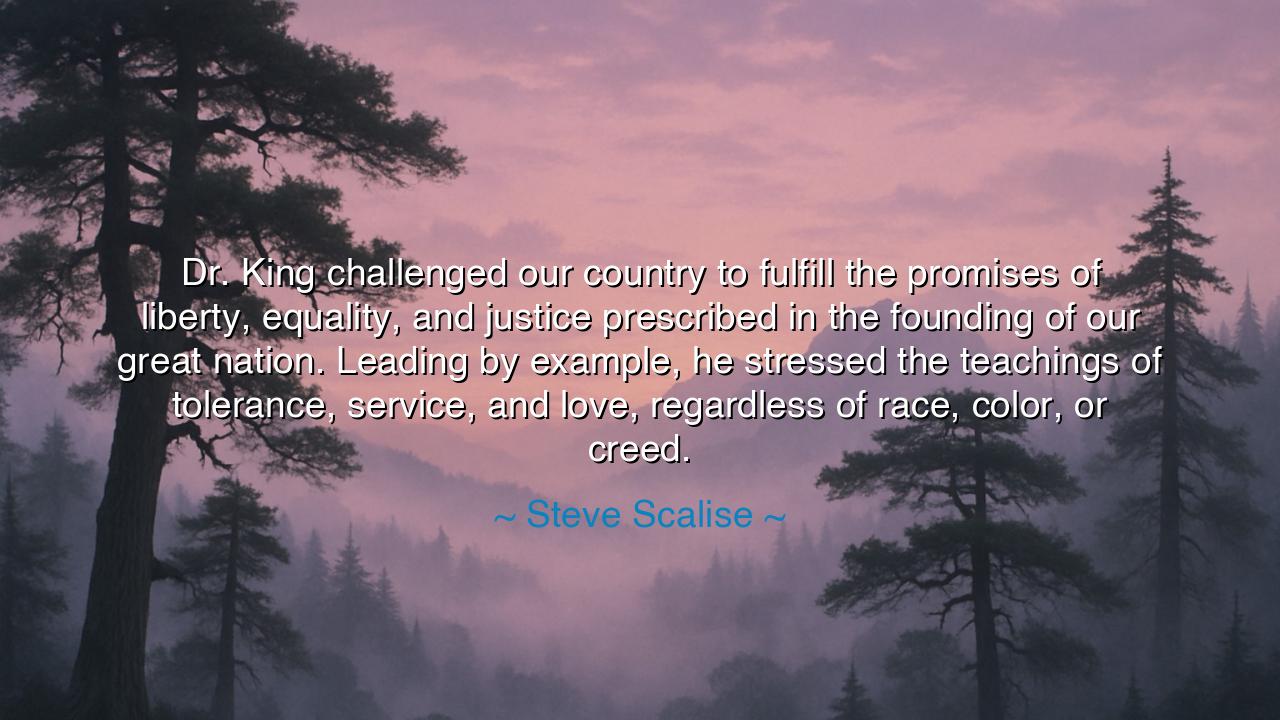
Dr. King challenged our country to fulfill the promises of
Dr. King challenged our country to fulfill the promises of liberty, equality, and justice prescribed in the founding of our great nation. Leading by example, he stressed the teachings of tolerance, service, and love, regardless of race, color, or creed.






O Children of the Future, hear the words of Steve Scalise, who speaks of the great Dr. Martin Luther King Jr., a man who forever changed the course of history. He says, "Dr. King challenged our country to fulfill the promises of liberty, equality, and justice prescribed in the founding of our great nation. Leading by example, he stressed the teachings of tolerance, service, and love, regardless of race, color, or creed." These words, full of reverence and respect, remind us of the profound legacy that Dr. King left behind—a legacy rooted in the very principles upon which the nation was founded, but a legacy that was not yet fulfilled when he first began his work. Dr. King did not only call for change; he embodied the ideals of freedom, equality, and justice in every aspect of his life.
In the ancient world, O Children, the concept of justice was seen as the very foundation of society. The Greeks, who built the pillars of democracy, considered justice to be one of the highest virtues, alongside wisdom and courage. Socrates, that great seeker of truth, questioned the nature of justice, asking his fellow Athenians to consider not just the laws of their city but the moral principles that should guide their actions. He believed that true justice was found in the pursuit of virtue and truth, not in the laws of the state alone. Plato, in his vision of the ideal society, imagined a world where justice was achieved by ensuring that each person contributed to society according to their best abilities, regardless of their social status or birth.
The ancient Romans, too, held justice in high esteem, but their approach was more pragmatic. Roman law was designed to maintain order and protect the rights of its citizens, yet even in Rome, the idea of equality was often elusive, as women, slaves, and non-citizens were denied many of the rights that the elite enjoyed. Dr. King’s challenge was, in many ways, to bridge the gap between the noble ideals of freedom and equality espoused in the American Declaration of Independence and the reality of a society where many were denied their basic rights simply because of the color of their skin. His message, like the ancient philosophers, was one of moral truth, calling upon his nation to fulfill the promises that had been made, not just in words, but in action.
Consider, O Children, the story of Dr. King’s historic March on Washington in 1963, where he stood before hundreds of thousands of people and delivered his famous “I Have a Dream” speech. In that moment, Dr. King did not just speak of the future; he proclaimed the ideals of freedom and equality that should be realized in the present. He called upon America to honor the founding principles of the nation, to live up to its promise of liberty for all people. His dream was not just a personal vision but a call for collective action, for the nation to act in harmony with the principles that had been written into its founding documents. Through peaceful protest, through tolerance, and through non-violent service, Dr. King embodied the very ideals of the founding fathers—but with a deeper understanding of what it meant to be truly equal in the eyes of the law.
The legacy of Dr. King is a legacy that calls for more than just legal equality. His teachings of love, tolerance, and service challenged each of us to live up to a higher standard—one where we do not simply demand justice but also offer it to others, regardless of race, color, or creed. His call to service—to live with an open heart and a willingness to give, to serve not just oneself but the community—is a timeless call. Dr. King taught us that true justice is not only the protection of our rights but the recognition and affirmation of the dignity of all people. He led not just with words, but through his actions, demonstrating that to serve others and to love one another is the foundation of any just society.
The lesson, O Children, is this: justice is not simply the absence of oppression, but the presence of love, tolerance, and service. Dr. King’s vision of a beloved community, where all people are treated with respect and dignity, is a vision that we must continue to strive toward. He showed us that equality is not a privilege granted by the state but a right that must be fought for and protected by the people. As Dr. King demonstrated, the path to justice is not one of violence or hatred, but one of non-violent action, peaceful protest, and unwavering dedication to the ideals of love and respect for all people, regardless of their background.
O Children, let this wisdom guide you: When you see injustice, do not turn away in silence, but stand up with courage and speak for what is right. Lead not with force or anger, but with the power of love, tolerance, and compassion. Let Dr. King’s example inspire you to live in service to others, to honor the founding ideals of your nation, and to work tirelessly for a world where liberty, equality, and justice are truly available to all. The legacy of Dr. King is not a distant memory, but a living call to action. It is a call for each of you to contribute to the beloved community he dreamed of, a community where all people, regardless of race or creed, can live in peace, dignity, and freedom.






AAdministratorAdministrator
Welcome, honored guests. Please leave a comment, we will respond soon